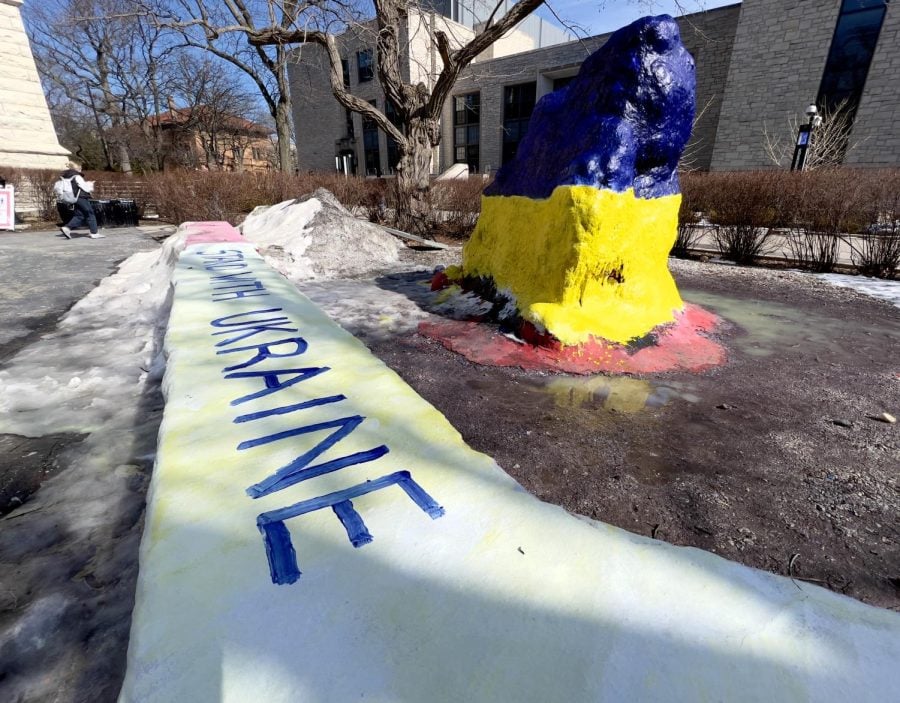Northwestern hosts U7+ Russia-Ukraine panel on geopolitical turmoil
Daily file photo by Jonah Elkowitz
Ukrainian students painted The Rock blue and yellow, the colors of the Ukrainian flag, on Monday and fundraised by The Arch.
April 5, 2022
Spotty internet service didn’t stop Kyiv School of Economics President Tymofiy Mylovanov from dialing in from Ukraine to a Tuesday morning panel about Russia’s invasion of Ukraine.
During the virtual panel, which was hosted by the U7+ Alliance of World Universities, academics from universities across the globe spoke about the invasion and discussed sanctions, human rights violations and the conflict’s broader geopolitical implications. NU serves as the organization’s secretariat and was one of 22 U7+ members to sign a letter denouncing Russia’s invasion of Ukraine in March.
“The way international help or cooperation is set up is human to human,” Mylovanov said. “This is really helpful in the beginning of the conflict of the war, when there is immediate need, but we need to also think about how we can have sustainable solutions.”
Moderator Annelise Riles, Northwestern’s associate provost for global affairs, kicked off the panel by asking Mylovanov, who served as Ukraine’s minister of economic development, trade and agriculture from late 2019 to early 2020, about the effectiveness of sanctions placed on Russia.
Sanctions are international trade policies used by states to encourage or discourage certain behavior, with recent U.S. restrictions on Central Bank of Russia’s assets being an example of conventional sanctions Mylovanov referenced.
“One way to think about (sanctions) is to split them into two groups,” Mylovanov said. “One is a conventional approach to sanctions. The other one is high-precision sanctions, like weapons.”
Since March, the U.S., along with several other countries, has implemented sanctions on certain Russian banks, Russian oil imports and Russian aircrafts in an attempt to cut Russia off from the international financial ecosystem.
The sanctions evoked a broader conversation about measures that could be used to take Russia offline further, including removing access to the Society for Worldwide Interbank Financial Telecommunications, a Belgium service that allows international interbank transactions.
“They have worked to an extent, but in economics, at least during the war, it’s the difference between inflows and outflows,” Mylovanov said. “As long as Russia continues to sell oil and gas, it will stay net positive.”
The United States has also released over $350 million in weapons stock to Ukraine to aid its fight against Russia, joining countries like France, The Netherlands and Germany in supplying arms.
The panelists also discussed the humanitarian effects of Russia’s aggression. As of April 5, more than a thousand Ukrainian civilians have been killed and many more have been wounded.
University of Toronto’s Dean of Faculty of Law Jutta Brunnée said Russia continues violating foundational norms established by the United Nations Charter, specifically the prohibition of use of force except in certain situations. Because the conflict is an international arms conflict, she said it falls under the Geneva Conventions, meaning Russia’s military objectives deliberately targeting civilians constitutes war crimes.
“There are currently UN human rights monitors in Ukraine condemning the use of explosive weapons and other indiscriminate attacks by Russian military forces on civilians and civilian infrastructure,” Brunneé said. “There is no justification. This is an egregious violation.”
The U.S. recently advocated for Russia to be suspended from the United Nations Human Rights Council due to war crime allegations.
Riles prompted the panelists to discuss how violations of international human rights norms are widely recognized by those outside of Russia, but Russian media has affected how the war has been perceived within the country.
“My advice is first to really look at the facts,” Paris School of International Affairs Russian Studies professor Marie Mendras said. “Stop listening to Russian media and to fake news coming from Russia.”
Last month, a Russian journalist ran in front of a live broadcast to protest the network’s broadcasting of “Kremlin propaganda.” Hundreds of independent journalists have left Russia in fear of being punished.
The panel concluded shortly afterward, with Mylovanov talking about how people could support Ukrainian academia through donations, joint conferences and special issues in academic journals.
“Don’t approach it as if there is some failing academia and they really need some charity. Of course they need money, but they need much more,” Mylovanov said.
Email: [email protected]
Twitter: @WhoIsAlexPerry
Related Stories:
— Ukrainian students begin fundraising after Russian invasion
— Ambassador in Residence Ian Kelly discusses Putin, Russia-Ukraine crisis during Global Lunchbox
— Prairie Moon sells Ukrainian soups, donates all proceeds to support citizens


